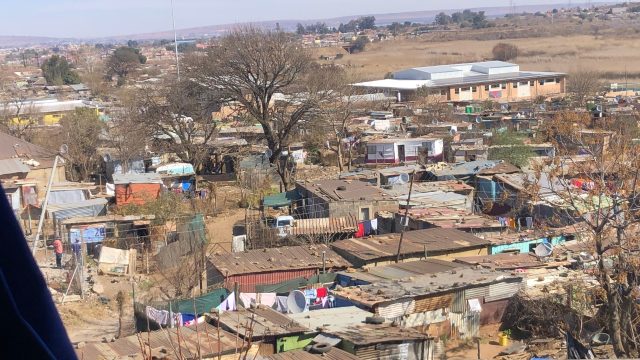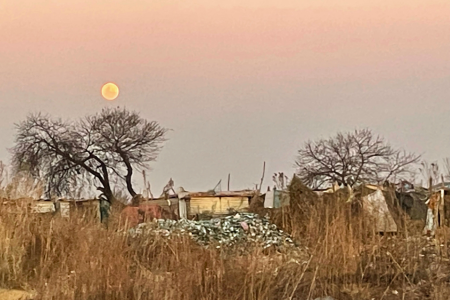19
Dec
Deadly Poisoning of Dozens of Children in South Africa Highlights Global Pesticide Threat to Human Life

(Beyond Pesticides, December 19, 2024) As The New York Times reported last month, the government in South Africa declared a national emergency—23 children died and nearly 900 people were sickened from pesticide poisoning in Johannesburg’s Soweto township. The illnesses and fatalities have been traced to small amounts of highly neurotoxic pesticides, including the insecticides terbufos and aldicarb, found in local food items. These chemicals, described by South African President Cyril Ramaphosa as “street pesticides,” are being increasingly used (legally and illegally) for pest infestations in the townships and informal settlements of South Africa’s poorest communities, where poverty and inadequate waste collection exacerbates the pest management challenges. Without formal electricity, running water, or municipal garbage collection, many residents rely on highly toxic pesticides for pest infestations in their homes and makeshift markets, resulting in food inadvertently being contaminated with pesticides.

The announcement highlights the dangers of allowing these highly toxic agricultural chemicals to be used in farming, with tragic consequences for vulnerable communities when they are diverted for use in urban settings. This tragic situation also draws attention to the elevated threat that pesticides pose when stringent enforcement mechanisms are not in place to ensure compliance with pesticide restrictions, even with the recognition that restrictions themselves are not necessarily adequate to protect the public’s health. Despite government plans to regulate small, informal stores known as “spaza shops,” advocates argue that, in addition to addressing the vestiges of apartheid, systemic poverty, and inhumane living conditions in informal settlements, the South African government should ban toxic pesticides in agriculture to “get hazardous pesticides off the street.” [The government announced immediate plans to inspect all registered South African terbufos manufacturers to ensure that practices are in place to prevent the diversion of farm pesticides to nonagricultural markets. Regulations on the traceability, repackaging, disposal, and sale of pesticides, insecticides, and food products will be reviewed. Additionally, the Department of Agriculture “… is in the process of reviewing and updating all relevant legislation with respect to the regulation and authorisation of agricultural pesticides for use in South Africa.”]
As reported, at least 23 children died as of the end of November, including six young children in an incident of eating contaminated snacks in Naledi, Soweto. South Africa’s National Institute for Communicable Diseases investigated this incident and attributed the deaths to traces of terbufos identified in a snack. The organophosphate terbufos can be lethal if ingested, inhaled, or through contact with skin, and, as President Ramaphosa wrote the following in his November 15 address to the country: “Even as our investigations are ongoing, it is critical to understand that this is not a problem confined to spaza shops and other informal traders. The unregulated use of restricted pesticides in communities has become a growing problem, with devastating consequences… In many townships, another chemical, aldicarb, and an organophosphate known as Galephirimi, are commonly sold by street vendors and hawkers to control rat infestations. Aldicarb has been banned for use in South Africa since 2016.” However, public health advocates argue that the government’s position does not go far enough (see here, here, and here).
In South Africa, tens of thousands of farmworkers are put at risk annually when they are exposed to highly toxic pesticides, including the carbamate insecticide aldicarb, often without proper personal protective equipment. In response, a partnership between Women on Farms Project and Oxfam (in South Africa and Germany) launched a “Double Standards Pesticides” campaign in 2019 to pressure the government of South Africa to ban 67 pesticides already banned in the European Union. As Beyond Pesticides has previously reported, the Women on Farms Project has organized protests in South Africa to demand an end to the indiscriminate importation and use of these insecticides, herbicides, and fungicides. More recently, over 150 farmworkers, primarily women, marched to the German Consulate-General to demand an end to the country’s exportation of pesticides that the country has determined are too dangerous for their own domestic use (see here and here). The South African protesters have called attention to what they describe as the hypocritical practices of European and U.S. agrochemical companies, which sell products in developing countries deemed unsafe for use in their own regions. Farmworkers have voiced their health concerns linked to petrochemical exposure, chanting, “We’re dying of asthma, we’re dying of cancer, we’re dying of heart attacks.”
Despite these efforts, including the march to the German Consulate-General and another at the South African headquarters of Bayer—the German corporation responsible for producing and exporting these agrochemicals—there has yet to be any significant change to these harmful practices. Bayer’s updated website highlights products such as the fungicide Antracol 70 WP (Propineb) and insecticides Biscaya 240 OD (Thiacloprid), Confidor (Imidacloprid), and Gaucho (Imidacloprid)—all of which are banned in the European Union (EU) but remain available for purchase in South Africa. These chemicals, in addition to product mixtures containing the weed killer paraquat and terbufos, are commonly employed in the region. The blatant sales of EU-prohibited and U.S.-banned substances in the Global South underscores that the ratification of international agreements (most of which the U.S. has not ratified) can sometimes be more symbolic than impactful. Without a global regulatory framework to manage such pesticides’ transport, storage, and use, these practices foster international dependency on hazardous chemicals in agriculture.
Beyond Pesticides, in alignment with public health and environmental advocates, argues that the regulation of petrochemical pesticides, even a global framework, will not provide a solution that addresses the enormous scope of the harm pesticides cause. The sale of pesticides deemed so hazardous they are banned in wealthier, predominantly Western countries represents a double standard that reflects a “lower value on lives and ecosystems in poorer nations.”
Many of the systemic injustices observed in South Africa parallel the challenges faced in the U.S. agricultural sector, like in California’s Central Valley and Florida’s citrus groves, where farmworkers face some of the lowest wages and harshest conditions, including exposure to toxic pesticides (see examples here, here, and here, including aldicarb use in citrus crops). These practices perpetuate environmental racism in agricultural work, with pesticide exposure, drift, and tainted water supplies compounding health risks for farmworkers and those residing in farming-intensive regions.
For more information on environmental racism in South Africa, see the talk of Marcos Orellana, PhD (See 2023 Forum, session 2), the United Nations Special Rapporteur on toxics and human rights. Dr. Orellana, an expert in international law and the law on human rights and the environment, issued UN reports in South Africa and Australia, capturing the significance of his work for environmental justice. Dr. Orellana teaches at the American University Washington College of Law. Dr. Orellana said, “The term ‘environmental racism’ describes institutionalized discrimination based on race or colour. In pre-1994 South Africa, the distribution of environmental risks and harms disproportionately and often deliberately targeted low-income groups and along racial lines. Today, despite the efforts by Government in setting up institutions and laws to address this legacy of environmental racism, pervasive air, water, and chemical pollution still imposes a heavy toll, especially on disadvantaged communities. Overcoming it will require significant additional efforts, including structural, legislative, economic, and environmental changes.”
Pesticide exports from U.S. manufacturers also contribute to the dangerous global impact of these toxic chemicals. As Beyond Pesticides reported, a 2024 Brookings study by Nathan Donley, PhD, and Robert Bullard, PhD found that between 2015 and 2019, the U.S. exported unapproved pesticides containing neurotoxic organophosphates and carbamates to 42 nations. Notably, 81% of these recipient countries were low-to-middle-income nations, and 78% were estimated to experience pesticide poisoning among more than 30% of their agricultural workforce each year. The 2015 documentary Circle of Poison—featuring Beyond Pesticides’ executive director Jay Feldman and luminaries including Vandana Shiva, Noam Chomsky, and President Jimmy Carter—also focuses on the toxic pesticide export issue. It documents the power of the global pesticide industry in shaping regulations (or lack thereof) and the dependency on petrochemical pesticides in food and farming around the world.
[The need to halt such exports stems from the concept of the “circle of poison,” where banned pesticides are exported, used abroad, and returned as residues on imported foods, contaminating domestic food supplies. These practices perpetuate environmental injustice, disproportionately affecting populations in developing nations and marginalized communities globally, including BIPOC (Black, Indigenous, and People of Color) populations in the U.S., who already face higher levels of pesticide exposure.]
Banned pesticides, often referred to as “legacy chemicals,” continue to harm agricultural workers decades later. Substances like DDT, DBCP, and PFAS—long banned or restricted—still affect human health and ecosystems today. This is not merely a historical issue but an ongoing crisis, as new toxic chemicals are introduced, used, and exported, with their full impacts often emerging years later (see here and here). The seemingly intractable problem of toxic pesticide exports remains unabated as the vested economic interests in the petroleum and chemical industry keep their grip on the chemical-intensive agriculture pesticide treadmill.
To address this challenge, Beyond Pesticides urgently calls for global collaboration to reframe the public debate and advocacy towards holistic systems change via support for organic land management. Global or national regulatory structures continue to fail to adequately protect human life and health, or the environment, and the price is too high to trust laws or enforcement can overcome industrial agriculture, pesticide and petrochemical industries, and their profit motive. A holistic solution that eliminates reliance on synthetic fertilizers and pesticides exists and U.S. organic certification and underlying principles serve as a model for a global shift in agriculture that prioritizes soil health, biodiversity, and the elimination of toxic chemicals.
The tragic and unnecessary deaths of twenty-three children in South Africa from pesticide exposure are a stark reminder of the urgent need for change. While it is too late to reverse the clock for those who have already suffered, decisive action can prevent future harm. American readers can call on legislators and regulatory agencies, particularly EPA, to end the export of pesticides banned or deregistered domestically.
Advocate for the elimination of hazardous chemicals by urging U.S. senators to ratify the Stockholm Convention and require EPA to classify persistent toxic petrochemical pesticides as unreasonable environmental risks as aligned with the Federal Insecticide, Fungicide, and Rodenticide Act (FIFRA). Visit Beyond Pesticides’ Agricultural Justice webpage to learn more!
As 2024 draws to a close, our team welcomes you to raise your voice and join us in forging a path to a livable future! For more information on Beyond Pesticides’ programs, please the newly-released Annual Report featured on our website!
All unattributed positions and opinions in this piece are those of Beyond Pesticides.
Feature image: View from Kliptown Youth Program Centre in Kliptown, Soweto, South Africa. Secondary image: Soweto, Johannesburg, South Africa. Photos by Beyond Pesticides’ Community Policy and Action Manager, Rika Gopinath.
Sources:
In South Africa, Food Poisoning Kills at Least 23 Children, The New York Times, November 23, 2024
Exported Toxicity: The EU’s Banned Pesticides in South Africa, Women on Farms Project, editor, solidar.org, February 2024
Government’s toxic malaise causes poisonings, not spaza shops, The Mail & Guardian, November 7, 2024
Bayer’s Use of EU-Forbidden Pesticides Ignites Protest in South Africa, Beyond Pesticides Daily News, September 19, 2023
Child and adolescent mortality associated with pesticide toxicity in Cape Town, South Africa, 2010–2019: a retrospective case review, BMC Public Health, April 2023
U.S. Exportation of Banned and Highly Restricted Pesticides Continues to Inflict Serious Harm Beyond Pesticides Daily News, August 5, 2022
Where Do Pesticides Banned in Europe Go? Mostly to Poorer Countries, While Two-Thirds of Those Sent to Richer Countries Head for the U.S., Beyond Pesticides Daily News, September 25, 2020










